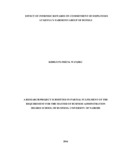| dc.description.abstract | The global economy currently has a predominant competitive environment where companies
spend considerable resources to ensure that their employees are motivated to contribute towards
enhanced employee commitment. Employees have been recognised as the overall most useful
resource. How a company performs is usually heavily affected by its employees through their
engagement, attitudes and motivation which influence the company. The paper sought to
investigate how intrinsic rewards affect the employees’ commitment at Kenya’s Fairmont Group
of Hotels. The study used descriptive survey research design. It aimed at the 367 employees of
Fairmont group of hotels in Kenya. The sample consisted of 110 employees carefully selected.
To obtain information, the study used structured questionnaires which were administered to key
respondents drawn from Fairmont group of hotels. Content analysis was used to analyze data to
arrive at analytical conclusions. The study revealed that most employees (72.2%) favoured career
growth and development as a source of motivation. A small number of the employees (21.0%)
noted that flexible work schedule plays a role in influencing affective commitment. The study
also established that majority (61.4%) of the employees did not think that meaningful work had
any impact on continuance employee commitment. Employee empowerment played insignificant
role in employee commitment. From the study, it is clear that the relationship between career
growth, flexible work schedules, meaningful work, organisational commitment and work
engagement is advantageous to Human Resource practitioners and managers in developing work
place strategies and also in improving positive workplace outcomes. On the basis of these
revelations, Fairmont Group of Hotels should formulate clear strategies and measures that can
improve employee commitment. Top management should provide adequate intrinsic rewards
which could enhance job commitment and which ultimately could lead to better output and hence
improve how companies perform. | en_US |



